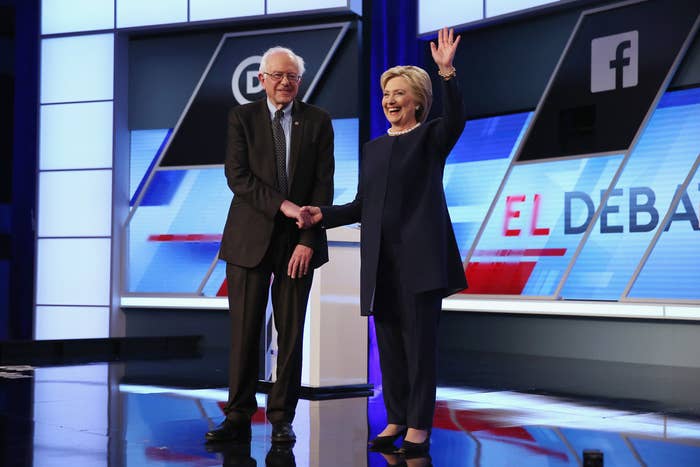
MIAMI — One of the first questions here on Wednesday night was among the most direct and straightforward either candidate has received in all eight Democratic debates — and yet neither Hillary Clinton nor Bernie Sanders would answer.
The matter at hand was Donald Trump, the business mogul who in his 2016 presidential campaign refused to immediately disavow endorsements from a KKK leader and white supremacist, who accused undocumented Mexican immigrants broadly of rape, who proposed a ban on Muslims entering the country — and who now appears to be on his way to securing the Republican nomination.
So, the Washington Post's Karen Tumulty asked, "is Donald Trump a racist?"
The two Democrats declined to respond with a "yes" or "no." Instead, as both have on previous occasions, Clinton and Sanders repudiated Trump's words and actions — and avoided judgements on his character as a person and candidate.
First, from Clinton:
"If I'm so fortunate enough to be the Democratic nominee, there will be a lot of time to talk about him. I was the first one to call him out. I called him out when he was calling Mexicans rapists. When he was engaging in rhetoric I found deeply offensive, I said 'basta!' Others are also joining in making clear that his rhetoric, his demagoguery, his trafficking in prejudice and paranoia has no place in our political system, especially from somebody running for president who couldn't decide whether or not to disavow the Ku Klux Klan and David Duke. So people can draw their own conclusions about him."
Followed by Sanders:
"This is what I think. I think that the American people are never going to elect a president who insults Mexicans, who insults Muslims, who insults women, who insults African-Americans. And let us not forget that several years ago, Trump was in the middle of the so-called birther movement, trying to delegitimize the president of the United States of America."
When Tumulty pressed Clinton on the question of "character" — on how one would describe "the character of a person who has said the sorts of things he has" — Clinton allowed that it was "un-American" and "not at all in keeping with American values." (Tumulty put the same follow-up to Sanders, but he did not address it.)
The question presents a tenuous semantic line for Democrats to walk, especially if Trump becomes the nominee. Asked about the issue afterwards, advisers from both campaigns, as well as officials from the Democratic Party, said that Clinton and Sanders could effectively call out Trump's policies and ideas as inherently bigoted and racist without calling him "a racist" — which, some aides said, would amount to the same kind of name-calling the GOP frontrunner has made his trademark.
"It's a pretty loaded question. And it's a question that doesn't generate a lot of substance," said Debbie Wasserman-Schultz, the chair of the Democratic National Committeee. "That was sort of an example of inviting them to name-call."
"It's not the label that's important," said Wasserman-Schultz.
Joel Benenson, pollster and top adviser for the Clinton campaign, said the former secretary of state has long made clear her view that Trump's comments and proposals are bigoted. "This is a word game," he told reporters after the debate. "She has been the first person to call him out on his disgraceful bigoted comments. She called them that. She denounced every Republican for not saying anything."
"When you call things bigoted," Benenson said, "voters in America know what that means."
On the Sanders side, aides offered a similar assessment.
"I don't think you can just paint with a broad-stroke brush," said his national press secretary, Symone Sanders. "But I think what the senator has said before — and he reiterated it tonight on the debate stage — is that there is no place for the kind of rhetoric Donald Trump is using. He has said it's riddled with Islamophobia, it's riddled with xenophobia, and it's riddled with bigotry and racist comments."
"It's strong language when you just flat-out call somebody a racist," she said. "Words matter."
Jeff Weaver, Sanders' campaign manager, argued that in the end, character judgments of course matter — but that they should be left to voters alone.
"What [Sanders] has said quite clearly is that a lot of what Donald Trump has said is racist." But ultimately, said Weaver, "the core character question about whether he is personally a racist is, I think, really a decision for voters to make."

